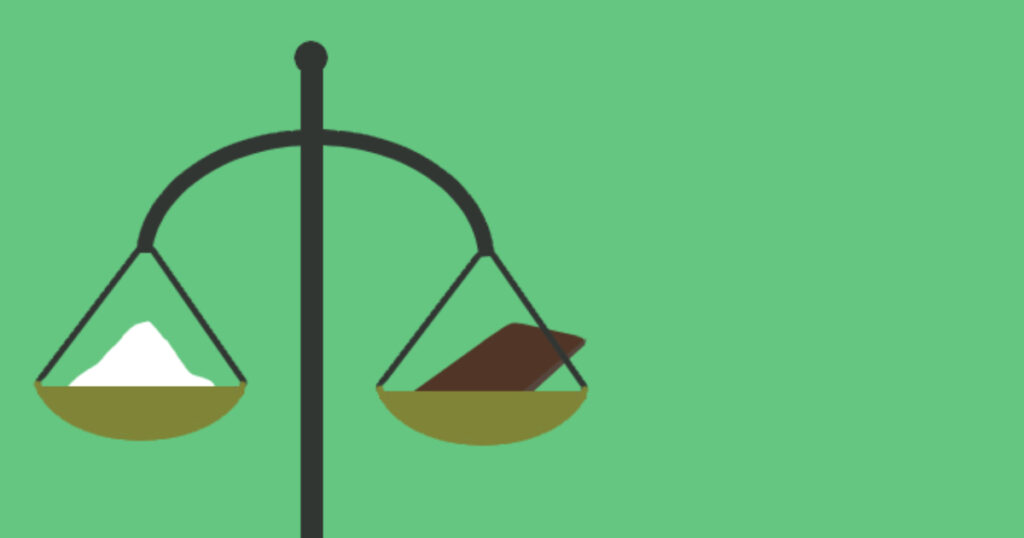I began a regular chocolate bar intake in junior high and have been trying to quit since my mid-thirties. For a long time it was the only sugar craving I experienced. I could turn down caffeine and cupcakes with no problem, for example.
Early experiments
This post lists a rundown of everything I did to combat these urges. Five of the methods did have promising results and might be of use even to non-chocoholics. There was also this experiment switching to bromide-free chocolate. Another trial involved limiting my intake to a hot liquid made from unsweetened cacao powder, and, boy, was that awful. That was a short one.
A redditor to the rescue
The impetus of this most recent self-experiment was a poster on reddit. He had just realized that chocolate had been an unrecognized source of inflammation and pain for years.
It occurred to me that in all my attempts to wrench myself from their vicious grasp, I’d never separated sugar and chocolate from each other before. What did I know about chocolate’s individual effect on my body and psyche? Since sugar is a pain reliever, could it be masking pain I could no longer register?
Finding a replacement drug
The current experiment started soon after those momentous thoughts. First I had to find a replacement for the sugar. I long ago eliminated it from the rest of my diet, except for my favorite Thai takeout. I am not a baked-goods person and ice cream isn’t portable, so those were out. If I had my druthers I would walk around in a beer helmet loaded with Thai iced tea, but the caffeine would kill me.
To start, I tried ginger ale, xylitol gum, different versions of caramels, and homemade vanilla fudge. Eventually I settled on one and only one brand of ginger ale, the gum, and butterscotch morsels.
After several months the gum began doing the same things to me that Gaba Calm sublinguals had. That 2013 episode ended with me pouring boiling water down my apartment drains for fear that I had become the vector for a lethal fungus. Sorbitol and xylitol are not my friends.
The ginger ale and butterscotch morsels also became unpalatable after a few months, as noted below.
An effortless start
After procuring my new drugs of choice, I simply stopped eating chocolate. It was pretty much effortless, although I did allow myself to fall off the wagon every weekend with several truffles from the local chocolatier. Basically I reduced my weekly intake by about 95%.
Nutritional therapy trials
In addition to the following, I took psyllium and a lot of water, on the theory that it speeds up the removal of garbage from the system.
Chromium
After about two months I starting taking chromium, which is the first or second thing experts recommend for sugar craving and which never worked for me, even in megadoses. It did not seem to do anything much at 500 mg, so I abandoned it after two weeks.
Digestive bitters
Once I realized my appetite was improving, after about six weeks, I started taking digestive bitters up to five times a day, which I believe helped my appetite return. After a few weeks, however, it began, shall we say, dissolving my tongue. That was the end of that. My interest in food did not devolve again after I stopped the bitters.
Changes I noticed
- Return of my appetite: As noted above. It had disappeared in junior high.
- Disappearance of chocolate cravings after three months: It became very easy not to fall off the wagon on the weekend, in great part because the effect on my mental state became so obvious.
- Change in food tastes: Fried food, even my favorite Thai food, is now gross.
- Significant reduction in other carb cravings: These are a lot easier to ignore now.
- Change in taste for sugar: after my original replacement foods became unappealing, I moved on to frozen cherries and homemade keto fat bombs.
- Clearer thinking: my thoughts stopped bunching up over themselves, or not so much anyway. I can look at a bird in a tree and not think of anything but that bird.
- Lessening of anxiety: I never associated the two before. Again, this aspect became clearer with each weekend nano-bender.
- Whiter teeth.
- Clear perception of the effect of chocolate on my mind: In addition to scattered thoughts and anxiety, there is a wee bit of stoned-ness, for example. Maybe that’s the increased oxytocin? dopamine? endorphins?
- Disappearance of low-grade nausea and abdominal pain: I hadn’t paid much attention to these episodes until they disappeared.
Why the changes?
I’m guessing the following qualities of chocolate combined over the years to wreak havoc on my various systems:
- It’s an allergen. High histamine causes all kinds of misery.
- It’s a source of magnesium, not at levels that would hurt you, but which might swamp other minerals in the body.
- . . . and copper, a metal that is toxic at high levels.
- . . . and bromine or bromides: Bromides build up in the body and also displace iodine. I once tried to avoid bromide-free brands, but my efforts tapered off eventually, due to the cost and availability.
- . . . and lead, which is toxic even in small amounts. Theoretically some brands of chocolate have tested with very low levels of lead, but if you’re eating it daily for decades, I don’t find that reassuring.
- . . . and cadmium, another toxic metal.
The website As You Sow has tested the levels of toxic metals in 469 chocolate products.
Weirdly not changing: non-graying hair
In the past, whenever I quit chocolate and sugar for at least three weeks, my hair would start turning gray. When I added it back to my diet, the color change would stop. This time, however, I have yet to see an increase in my graying rate. I have seen mentions of a link between graying hair and high copper levels, which chocolate has an abundance of. Perhaps it’s just more difficult to get rid of excess copper as we get older.
_______________
This content was first published on May 3, 2023.

Marjorie R.
Marjorie is the creator of AvoidingRx.com, a record of her and her guest authors’ experiences with non-prescription health solutions. She is a third-generation nutritional-therapy self-experimenter.





